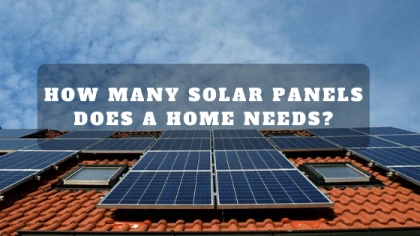It's important to choose the best solar panels for your home, regardless of whether you're installing a DIY system or having a solar company handle the details. Although there are so many panels available, it can be hard to know which one is right for you.We'll give you 5 of the best residential solar panels, ranked by price, efficiency, and materials. The best solar panels for every system will vary depending on the home. Choosing the right solar panels for a household's energy needs requires homeowners to assess their specific needs.It is the homeowner's responsibility to purchase a solar power system for their home in order to benefit from solar energy. The most common system will consist of an array of solar panels, a battery, and an inverter.These are the 5 best solar panels for home use according to efficiency, durability, warranty, price point, and thermal coefficient:LG: Best OverallSunPower: Most EfficientPanasonic: Best Temperature CoefficientSilfab: Best WarrantyCanadian Solar: Most AffordableThere are pros and cons to each of these solar panels, and each excels at something specific. It is crucial to consider your home and solar power system needs when choosing the best solar panels for your home.How to get the best out of solar panels?A number of types of solar panels produced by the industry's top manufacturers were carefully researched and evaluated according to a variety of criteria. We considered factors such as:Efficiency:Solar panels can convert sunlight into useful energy based on their efficiency rating. Remember that solar panel efficiency reaches just over 20%, and generally speaking, you will save the most energy by choosing the most efficient solar panels. To get the most out of your solar panels, you'll need more efficiency the less space you have.Durability:It's not surprising that homeowners want products they can rely on for a long time after they purchase solar panels. Therefore, you should look for solar panels made from materials that are durable and can withstand even intense weather conditions.Warranty:When you purchase residential solar panels, having a long-term performance warranty can give you comfort. You can see in this solar industry, a decent warranty may last from 10 to 25 years.Price Point:If you are thinking about investing in solar panels, you should definitely consider your budget. Prices for solar panels can vary depending on many factors. You should also consider durability, efficiency, and warranty when considering a panel's price tag, as those factors contribute to the panel's overall value.Temperature CoefficientIn addition to ranking factors, the temperature coefficient is also important. As the external temperature rises, the efficiency of solar panels decreases in proportion to that difference. In order to produce power year-round, solar panels must perform well even in extreme heat. How to choose the right solar panel for your home?The following tips will help you select the best residential solar panels.Consider EfficiencyHow much you can save on monthly utilities and when you can recoup your investment will largely depend on how efficient your solar panels are. The panel efficiency for each solar panel is rated; the industry standard is 17 to 20%, so anything in that range is going to do pretty well. As we mentioned, SunPower's panels have the highest efficiency rating we've found, at 22.7%. Check Warranty InformationComparing the warranty of a panel with that of the industry is another smart move. At least ten years of warranty should come with any solar panels you purchase. It would be ideal to find something with a warranty of 25 years.Compare Price and EfficiencyAdditionally, you should be aware that the most efficient solar panels are not always the most affordable. It is sometimes beneficial to opt for a slightly less efficient product. When setting your solar budget, also consider the costs of solar panel installation and additional parts such as inverters and battery banks.What are the types of solar panels?If you are shopping for residential solar panels, knowing the types of panels available is also helpful. Polycrystalline, monocrystalline, and thin-film panels are the three main types. There are pros and cons to each type:Monocrystalline: Monocrystalline panels contain only one crystal of silicon. A more expensive manufacturing process allows them to have higher efficiency levels, but they are also more expensive. Note: Monocrystalline solar panels are the only option if you are limited in space on your roof and can only fit a few panels.Polycrystalline: Solar panels made of polycrystalline silicon are also composed of silicon, but in this case, the pieces are broken down into smaller ones. Because they are not monocrystalline, their efficiency is often a little lower, however, they are often more affordable.Thin-Film: There are many thin-film materials available for solar panels. Thin-film panels work better for RVs and camping than for homes because they are lightweight, flexible, and portable. In comparison to the other two options, thin-film panels can be relatively inefficient.Do Solar Panels Require Maintenance?One of the most common questions homeowners have when weighing the pros and cons of solar energy is whether they will need to maintain their solar panels.It is mostly the front end that requires all the hard work. Most solar installations take a few days to complete, and it requires a good understanding of electronics as well as solar power. Professional solar installers are recommended.The level of maintenance required is fairly minimal once your system is set up. With the exception of routine cleaning, your solar panels shouldn't need any maintenance for 20 to 30 years. You should be covered by your warranty if you run into an issue.What Impacts Solar Panel Performance?The performance and productivity of solar panels can vary greatly. Your residential solar system may perform differently depending on a number of factors, including:Orientation: Your installation team will carefully position each solar panel to maximise its exposure to the sun when designing your solar system. It can be detrimental to your system's efficiency even if its orientation is slightly off.Weather and sun exposure: if your solar panels are frequently covered in clouds, or if you live in a cloudy area, you won't have the ability to produce as much energy.Cleanliness: While most solar panels require virtually no maintenance, they can occasionally need a wipedown, especially after an intense storm or when pollen or leaves are falling, blocking your panels. The panels won't be able to take in as much sunlight if they are covered in grime or debris.Shade: Your solar panels will be less efficient if any shade is cast over your roof. Having tall trees around your house, for example, could hinder solar production.Bottom Line: Are Solar Panels Worth it for your houseSolar power is becoming more attractive as homeowners seek clean energy solutions. Utilising the sun's natural energy can reduce homeowners' dependence on traditional utilities. As well as reducing direct contributions to atmospheric pollution, this yields significant savings on electric bills (potentially even eliminating those bills completely).Finally, solar panel purchasing is a highly individual decision. Going solar can be a good decision for some homeowners. For others, it may prove unfruitful.If you're considering what's best for you, consider the following: your roof surface area, the weather you get, and your exposure to sunlight.Consider the panels themselves as well: Which performance factors should you consider? Which type of panel is best? And which brand would be the most appropriate for your needs and budget?Making an informed decision about the best solar panels is possible if you take into account all of these factors. https://solwiser.com/how-many-solar-panels-do-i-need/




